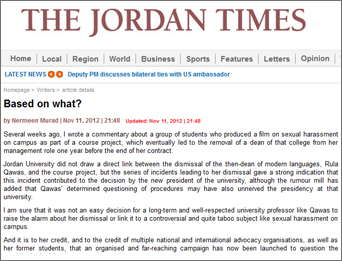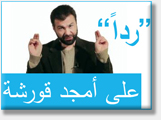Based on what? by Nermeen Murad
Based on what?
by Nermeen Murad | Jordan Times Newspaper
Several weeks ago, I wrote a commentary about a group of students who produced a film on sexual harassment on campus as part of a course project, which eventually led to the removal of a dean of that college from her management role one year before the end of her contract.
Jordan University did not draw a direct link between the dismissal of the then-dean of modern languages, Rula Qawas, and the course project, but the series of incidents leading to her dismissal gave a strong indication that this incident contributed to the decision by the new president of the university, although the rumour mill has added that Qawas’ determined questioning of procedures may have also unnerved the presidency at that university.
I am sure that it was not an easy decision for a long-term and well-respected university professor like Qawas to raise the alarm about her dismissal or link it to a controversial and quite taboo subject like sexual harassment on campus.
And it is to her credit, and to the credit of multiple national and international advocacy organisations, as well as her former students, that an organised and far-reaching campaign has now been launched to question the president’s decision.
There are several issues and concerns raised by this very important debate. First and foremost, it is about academic integrity and the delineation between the president’s authority and the independence of academics.
Where in the developed world can a university president just remove a dean because he wants to?
The fact that the current president’s response to the campaign to support Professor Qawas was that he used his prerogative to replace the dean raises alarm over who gave him that authority, the extent of that authority and how we can ever hope to have an independent academia in Jordan if appointed presidents that come and go every other year can, on a whim, remove deans and replace them without having to show good academic reason or follow any well-known, democratic or consensual process.
Second, the controversy over the film on harassment and the reaction of the university so far show that the university has no understanding of its duty to protect the students and, most importantly, to safeguard and protect their personal freedom and choices while on campus.
The university is not mandated to impose any particular value system or dress code on its female students and has a duty to protect all its students from violence, physical or verbal, regardless of anyone’s personal value system.
So it bewilders me how the university — despite the film and the ensuing controversy leading up to Qawas’ removal, did not see fit to announce or take any action to protect its students from being harassed or take punitive action against the students who approach female students aggressively.
Exactly what ethical standard has the university shown in its decision to turn its back to this problem despite all the fuss raised by the students and now international academic organisations?
Third, and I believe very importantly, while this whole issue appears at first glance to highlight a problem in our universities and among academic circles, I believe it draws attention to the problem with the so-called demands for reform in Jordan.
Reducing reform to some political acrobatics and a couple of amendments on a couple of “democracy” laws showcases the shallowness of our understanding of the requirements of genuine reform.
I find myself asking myself where are the Jordanian champions supporting these students and their professor within our government, within our echelons of power, in civil society, among women’s organisations, in academia, among political parties and among the grassroots organisations?
Is the subject of women being harassed and a woman being removed from her management position in academia as a result not sexy enough for our political system?
Is our political system too male centric to care about women’s issues? Are important issues for our “reformists” only those related to the monarchy, parliament and political parties?
Aren’t the problems of academic integrity, standards and lack of any democratic or transparent process important enough for our lofty politicians, both old and new?
I hope that this problem makes us wake up to the depth and breadth of the problem with embarking on any serious national reform programme that has any credibility.
This controversy has highlighted that we have a serious gender inequality and disrespect, an issue that is now being carried forward to the next generation.
We have a problem with management in academia that allows for personal selection and disregards well-established worldwide standards, and we have a problem — at all political levels — in understanding the requirements of true reform that can improve the lives of all Jordanians regardless of where they undergo “injustice”.





Trackbacks / Pingbacks